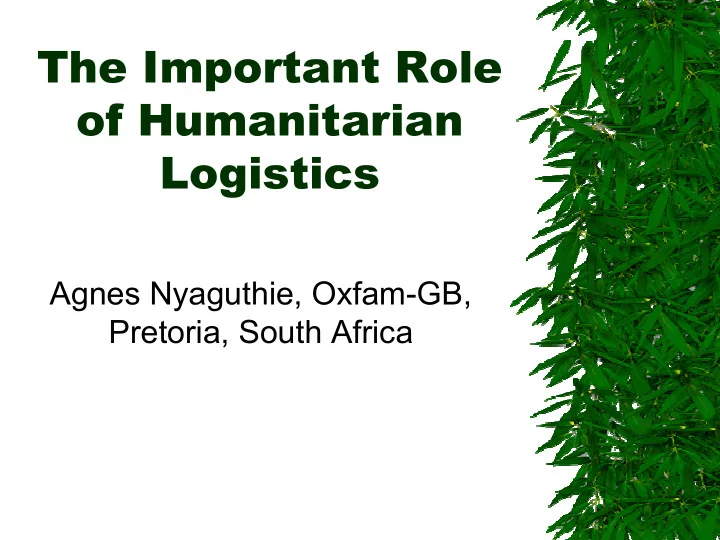

The Important Role of Humanitarian Logistics Agnes Nyaguthie, Oxfam-GB, Pretoria, South Africa
Map of Southern Africa Region
Update from the field cont--- Introduction: As Africa continue to struggle to achieve the MDG, complex emergencies continue to emerge, Interventions continue to grow in large scale and budget and so has been donors and public demand for increased operational and fiscal efficiency. This state of affair places Logistics and Supply chain management, which is a core function in the successful delivery of Humanitarian relief at a very strategic level, hence demanding a more sophisticated level of supply chain management practice and competence. Humanitarian organizations now more than ever must deliberately focus on developing logistics to be able to fully support the implementation of these Goal.
Humanitarian Logistics: Networks for Africa � ?-WHY � In Support for Implementation of MDGs: � Goal 1: Eradicate Extreme Poverty and Hunger � Goal 2: Achieve Universal Primary Education � Goal 3: Promote Gender Equality and Empower Women � Goal 4: Reduce Child Mortality � Goal 5: Improve Maternal Health � Goal 6: Combat HIV/AIDS, Malaria and other diseases � Goal 7: Ensure Environmental Sustainability � Goal 8: Develop a Global Partnership for Development
Humanitarian Logistics: Networks for Africa The Millennium Development Goals are a framework world leaders � agreed upon to reduce poverty and improve the wellbeing of people. All the Southern Africa countries are signatories to the Millennium Declaration The first seven goals are directed at reducing poverty in all its forms: � hunger, lack of income, education and health care, gender inequality, and environmental degradation. The eighth goal provides the means to achieving the first seven. Partnership at the global level calls for the developed nations to assist developing countries to meet those goals. At the national level it challenges Government, private sector and civil society to work together towards the achievement of the MDGs.
Logistics Management defined � Logistics management is "That part of the supply chain process that plans, implements and controls the efficient, effective flow and storage of goods, services and related information from the point of origin to the point of consumption, in order to meet the customers' requirements."(CLM 2002)
Donor Community CBOs UN/Int. Org Community Government/ local Authorities Business Community A basic network model
How does Humanitarian Logistics Supports Networks for Africa? � Coordination, ie The various clusters, IASC, Meetings, Forums, etc � Workshops/Trainings � Consolidation and Information sharing at the field level � Consultations � Projects implementation Support
How does Humanitarian Logistics Supports Networks for Africa � Through efficient Logistics plans � Innovative Procurement(Order consolidation, KPIs. � Sound Logistics procedures and systems � Capacity building
International Organizations in Chupanga camp in Mozambique Sharing the Warehouse Space
Police officers managing the security of the Chupanga camp during the Floods response in Mozambique
Oxfam water Tanks and Tents from UK for use in Mozambique
Kakolo village: Oxfam staff Consulting with beneficiaries to receive goats to Support HIV/AIDS
Goats being loaded onto a tractor Trailer for Transportation to the Distribution Site
The Owner of the Goats holding site checking the Trailer ready to move
Community Vet person At the goats distribution site. Oxfam staff verifying the Beneficiary register
Women receives the Goat: Each HH receives two she goats and one he goat and once the she goats give birth, the kid is to be given to another HH and the thread continues
Current Network Initiatives(UN Humanitarian Response Depot)
Advantages � Cost efficiency � Timeliness of the response � Better Coordination � Standard Operating Procedures, hence high level of accountability
Master of All:That is who we are!!!!!
Recommend
More recommend